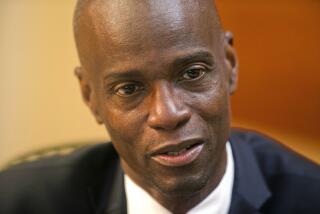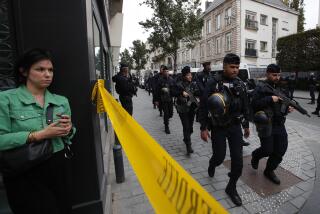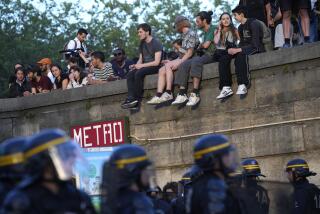WWII Collaborator With Nazis Slain in Paris : France: Vichy police chief was facing war crimes trial. Killer says he’s an agent of ‘good.’
- Share via
PARIS — Only months before his trial on French charges of crimes against humanity, Rene Bousquet, national police chief in the World War II Vichy government that sent thousands of Jews to Nazi death camps, was shot to death in his Paris apartment Tuesday.
His killer claimed to be an agent of “good” fighting the forces of “evil.”
Christian Didier, 49, was arrested after he summoned reporters to his hotel in a seedy Paris suburb to detail how he entered Bousquet’s modern glass apartment building in one of Paris’ better neighborhoods and killed the former collaborator with four shots from his revolver.
In 1987, Didier served four months in prison for trying to kill former German Gestapo chief Klaus Barbie, who was in prison at the time awaiting trial on charges that he ordered the deaths of Jews and resistance leaders in Lyon.
Bousquet, 84, was the senior Vichy police official in unoccupied France between 1942 and 1944. It was in this period, July 16-17, 1942, that 12,000 Jews were rounded up in a Paris stadium built for bicycle races and deported to Germany. Former Nazi SS and Gestapo chief Heinrich Himmler described Bousquet in one memorandum as an “invaluable collaborator.”
In 1949, Bousquet was tried for treason by the French High Court and briefly deprived of his rights as a citizen. However, like many other French collaborators and members of the Vichy government, he soon shed the stigma of his wartime service for the Germans and served as a banker and board member for several corporations, including the privately owned Baccarat crystal company and the state-owned airline UTA, now part of Air France.
It was not until years later, in 1978, when he was named by former Vichy official Louis Darquier de Pellepoix as the person mainly responsible for the roundups of Jews by French police, that Bousquet was forced to resign from the boards of UTA and the Banque de l’Indochine et de Suez.
Bousquet defended himself by asserting variously that he tried during the war to protect French citizens from German atrocities or that he was merely following orders. “I am not and never have been anti-Semitic,” he said.
Jewish leaders in France expressed regret that there will now be no trial of Bousquet. They had hoped to have more light shed on the extent of the collaborationist Vichy regime’s anti-Semitic persecution. Jean Kahn, president of France’s Jewish community, said:
“I regret there will be no Bousquet trial because it would have taught an immense lesson by putting French collaboration on trial. No one has the right to take the law into his own hands.”
Based on evidence presented by French attorney Serge Klarsfeld, Bousquet was charged in April, 1991, with crimes against humanity. Similar charges were filed again in June, 1992, against him and Maurice Papon, 83, the top police official in Bordeaux during the war.
The two were accused of rounding up thousands of Jews for deportation to Nazi death camps. Under the Vichy regime, about 140,000 people, including about 75,000 Jews, were deported to Nazi death camps.
Bousquet’s slaying came a week after a French court ruled that another Frenchman, Paul Touvier, could stand trial for crimes against humanity in connection with actions during the war. He would be the first Frenchman tried for crimes against humanity.
In a televised interview on the French TF1 network that was taped shortly before his arrest, Didier said his main concern during the killing was the safety of Bousquet’s dog.
“He opened the door to me,” Didier said. “I had climbed to the sixth floor. He had a young Alsatian. That worried me, because I didn’t care about shooting that piece of garbage (Bousquet), but if his Alsatian had jumped on me, I would have had to defend myself and shoot the dog. . . . But the dog ran away.
” . . . I pulled out the revolver and fired at point-blank range, but he ran toward me. The guy had incredible energy. I fired a second time and he kept coming at me. I fired a third time and he started to stagger. The fourth time I got him in the head or the neck and he fell.”
Investigators said Didier’s detailed account tallied with the facts.
More to Read
Sign up for Essential California
The most important California stories and recommendations in your inbox every morning.
You may occasionally receive promotional content from the Los Angeles Times.













